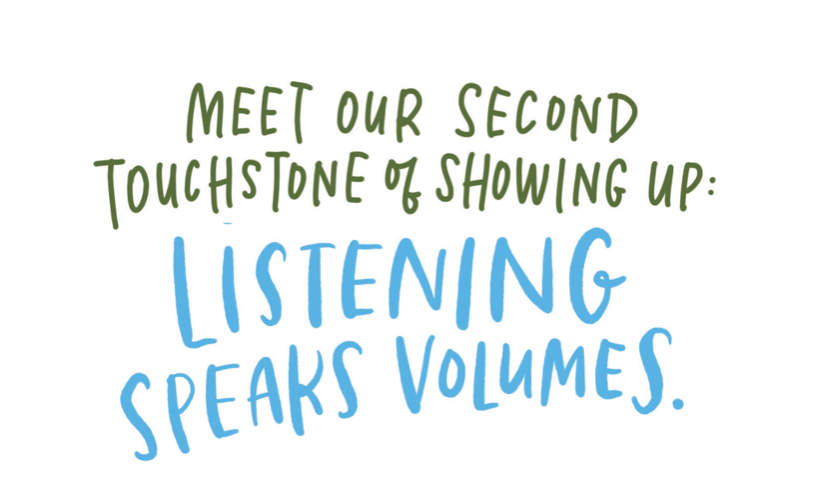The best way to have a conversation with someone in a difficult time is not in the talking, but in the listening.

As the mom of a child with cystic fibrosis told us:
“People think that by listening, they aren’t contributing to the conversation. Totally wrong. Listening to me talk about this horrible disease is one of the biggest gifts that I can receive.”

The enormous value of listening is probably not news to most of us, but when the shit hits the fan and your friend is in pain, “How can I make this better?” is a totally natural reaction.
Yet, before diving into rescue mode with advice, alternative ways of looking at things, or asking a lot of clarifying questions — all the things you want to be really cautious about doing — communication experts advise getting to a place of what they call “emotional resonance” (see our discussion of emotional resonance on page 60). That means using the act of listening to tune in to how someone is feeling about her situation.
Ask people what matters most about listening and they will inevitably tell you it’s having someone hear your experience without judgment. What’s more, listening actually helps a person better understand their experience in the course of telling it. One man from an Empathy Bootcamp put it this way:
“As the relationship with my wife started to go south, my family and friends listened to me patiently over many years. I had to talk it through several times (ad nauseam) in order to come to the best decision about what to do.”

The first thing to get really good at when wanting to listen is also probably the biggest hurdle to listening, which is sitting “dumbly” quiet while someone else talks.

So after your friend shares a piece of bad or scary news, practice waiting three seconds before responding. This sounds like a short amount of time, but in reality, it can feel like an eternity if you’re not used to it. So prepare to exercise restraint, and prepare for uncomfortable silence.

A couple of things may happen: either the silence continues — and you both learn that sitting together in the introspective quiet, feeling how life can be hard, is actually pretty profound and amazing (rather than shallow and awkward) — or your friend may very well fill up the silence by talking even more about what is going on. Either thing encourages authentic communication.
To help you learn to listen better, we’ll first do an inventory of some normal, common go-to responses that many of us lean on.

Next time you are listening to someone — about pretty much anything — take note of how you tend to respond, especially if what’s being shared is a vulnerable topic. And take heart: we all have at least one of the nonlistener tendencies (and we discuss them in greater detail in this chapter and the next). Then, just practice not doing that thing you normally do.
You know what comes next: just stay quiet (for three whole seconds!) and listen.

Find a friend and practice this skill: Spend two minutes each, sharing a story of something difficult that has happened in your life. You might want to start by picking something not emotionally charged right now, but something that was a big deal in the past. Here are the rules:
The Listener:
Absolutely no talking of any kind, even if it’s just clarifying questions. You can nod and show in your face that you hear, but remember: bear the awkward silence.
The Talker:
Share your story and proceed on with it, even if the silence is a little unnerving.
After each of you has shared your story, consider these questions:
●● How did it feel to have the “space” to tell your story without interruption?
●● Did the listener do something that helped you relax? How about something that made you uncomfortable?
●● What is especially powerful about being listened to (especially when it’s not an artificial exercise)?
●● Were there times you wanted to jump in and say something while the other person was talking? What did you feel compelled to say? (This is also a really good way to identify your go-to “nonlistening” responses.)
●● What was it like to stay silent throughout the story? What concerns about staying quiet did you have?
●● What benefit did you get out of listening?
Printed from THERE IS NO GOOD CARD FOR THIS: What to Say and Do When Life is Scary, Awful, and Unfair to People You Love. Copyright 2017 By Kelsey Crowe, PhD and Emily McDowell. Reprinted with permission by HarperOne, a division of HarperCollinsPublishers.
Originally published at medium.com


